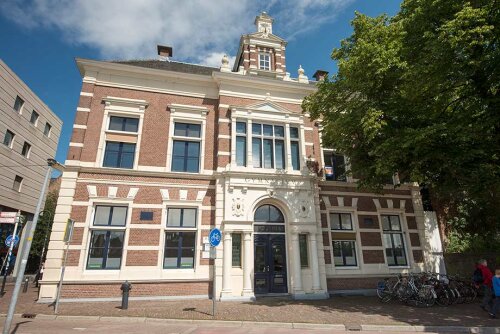Best Child Abuse Lawyers in Delft
Share your needs with us, get contacted by law firms.
Free. Takes 2 min.
Free Guide to Hiring a Family Lawyer
List of the best lawyers in Delft, Netherlands
About Child Abuse Law in Delft, Netherlands
This guide explains how child abuse cases are handled in Delft and the Netherlands more broadly. Child abuse can include physical harm, sexual abuse, emotional abuse, neglect, or exploitation of a child. The Dutch system divides responses between civil youth care and criminal justice. Civil youth care - led by the municipality under the Jeugdwet (Youth Act) - focuses on protection, support and treatment for the child and family. Criminal law - under the Wetboek van Strafrecht - addresses criminal acts such as assault or sexual abuse and can lead to police investigation, prosecution and criminal penalties. Specialized agencies such as Veilig Thuis, the Raad voor de Kinderbescherming and local youth care services in Delft play central roles in reporting, assessing and deciding on protective measures.
Why You May Need a Lawyer
A lawyer can help in many situations involving suspected or confirmed child abuse. You may need legal help if you are a parent, guardian, extended family member, professional or child facing any of the following circumstances:
- A criminal investigation or prosecution has started against a parent, caregiver or other person accused of abusing a child.
- The municipality proposes a formal youth protection measure such as an ondertoezichtstelling - OTS - or an uithuisplaatsing - out-of-home placement.
- Disputes over parental authority, custody, visitation or relocation after allegations of abuse.
- You need to file a civil claim for damages or want to respond to a protective measure imposed by the court.
- A child needs legal representation or appointment of a guardian for decision-making during legal proceedings.
- You need advice on confidentiality, mandatory reporting obligations or data protection when professionals share information.
- You require help applying for legal aid or challenging decisions by the municipality, the Raad voor de Kinderbescherming or the court.
Local Laws Overview
Key legal and institutional elements relevant to child abuse in Delft include:
- Jeugdwet (Youth Act) - The Jeugdwet makes the municipality responsible for organising youth care, prevention and child protection in its area. Delft municipality manages access to jeugdhulp, crisis interventions and youth protection measures.
- Civil youth protection - The Raad voor de Kinderbescherming (Child Protection Board) investigates suspected endangerment and can request the court to impose measures such as ondertoezichtstelling - OTS - or a gezinsvoogdij - family guardianship - and temporary out-of-home placement.
- Family and youth courts - The juvenile division of the rechtbank (district court) decides on civil protective measures, guardianship and swift interventions when a child is at risk.
- Criminal law - The Wetboek van Strafrecht criminalises physical assault, sexual offences, neglect and other forms of abusive behaviour. The police and Public Prosecution Service - Openbaar Ministerie - conduct criminal investigations and prosecutions.
- Reporting and advice - Veilig Thuis is the national advice and reporting centre for domestic and child abuse. Professionals and citizens can report concerns. The centre advises on necessary next steps and may refer matters to police, the municipality or the Raad voor de Kinderbescherming.
- Privacy and data protection - Personal data is protected under the Algemene verordening gegevensbescherming - AVG - and professional confidentiality rules. Sharing information for child protection may be lawful when necessary to safeguard the child, but there are legal limits and procedural requirements.
- Legal aid - People with limited means may qualify for subsidised legal assistance - gesubsidieerde rechtsbijstand - administered by the Raad voor Rechtsbijstand. Municipalities are also responsible for offering accessible youth support and mediation services.
Frequently Asked Questions
What should I do immediately if a child is in immediate danger in Delft?
If a child is in immediate danger call the emergency number for the police. If the situation is not an immediate emergency but you suspect abuse, contact Veilig Thuis for advice and to make a report. If medical attention is needed call or visit a hospital or general practitioner. Prioritise safety and preserve evidence where possible.
Who can report suspected child abuse?
Anyone can report suspected child abuse - family, neighbours, professionals or the child. Certain professionals working with children have specific duties under professional standards to act on concerns and often follow local reporting protocols. Reports can be made to Veilig Thuis, the police or the municipality.
What happens after I report to Veilig Thuis?
Veilig Thuis assesses the report and provides immediate advice. They may recommend measures, refer to municipal jeugdhulp, involve the Raad voor de Kinderbescherming for investigation, or escalate to the police if a criminal offence is suspected. They aim to coordinate the response and prioritise the childs safety.
Can the municipality remove a child from home?
The municipality cannot itself order a removal. The Raad voor de Kinderbescherming can request court measures and the judge can order an immediate uithuisplaatsing (out-of-home placement) in urgent cases. Removal is usually considered a last resort and follows assessment and legal procedures. Parents have rights to be heard in proceedings, but emergency placements can occur quickly if the child is at serious risk.
Will a child be represented in court?
Yes. In judicial procedures affecting a childs rights or safety the court ensures the child’s interests are represented. The judge may appoint a guardian or a lawyer for the child, depending on the childs age and the nature of the proceedings. A lawyer for the child will speak for the childs best interests in court.
Can a parent lose custody because of abuse allegations?
Yes. If the court concludes that a child is at risk and that parental care endangers the childs safety, it can limit or remove parental authority, impose supervision measures, appoint a guardian or order out-of-home placement. The decision is based on evidence and reports from agencies such as the Raad voor de Kinderbescherming.
What if criminal charges are filed against the alleged abuser?
If criminal charges are filed the police and Public Prosecution Service handle the investigation and prosecution. Victims and witnesses may be interviewed and can receive victim support services. A criminal conviction can affect civil measures, custody and may be used as evidence in family or child protection cases.
How is confidentiality handled when professionals share information?
Professionals are bound by confidentiality, but the law allows sharing of personal information when it is necessary to protect a child and proportionate to the risk. Sharing should follow protocols and only include information needed for protection. If you are unsure about what may be shared, ask the professional or seek legal advice.
How do I get legal aid or a lawyer for a child abuse matter?
You can look for an attorney specialised in youth law, family law or criminal law. If you cannot afford a lawyer you may qualify for subsidised legal aid - gesubsidieerde rechtsbijstand - through the Raad voor Rechtsbijstand. The municipality or legal aid offices can explain eligibility and help with an application.
How long do child protection procedures usually take?
Timelines vary widely. Emergency decisions can be made within hours to secure safety. Court decisions on protective measures may take days to weeks depending on urgency and complexity. Criminal proceedings can take months or longer. Early legal advice helps you understand expected timelines for your case.
Additional Resources
Below are the types of organisations and services that can help people in Delft who are dealing with child abuse issues. Contact these organisations for support, reporting and advice:
- Veilig Thuis - national advice and reporting centre for child and domestic abuse.
- Politie - for urgent situations and criminal reporting.
- Openbaar Ministerie - Public Prosecution Service handles criminal prosecutions.
- Raad voor de Kinderbescherming - investigates suspected child endangerment and advises courts.
- Gemeente Delft - department for youth and family services that organises jeugdhulp and crisis support under the Jeugdwet.
- Local youth care providers and family centres - often called Centrum voor Jeugd en Gezin or jeugdhulp organisaties in Delft.
- Kindertelefoon - national helpline for children to report worries and get advice.
- Raad voor Rechtsbijstand - for information about subsidised legal aid and how to apply.
- Victim support services - for emotional support and practical help when abuse or a crime has occurred.
Next Steps
If you are dealing with a suspected or confirmed child abuse situation in Delft, follow these practical steps:
- Ensure immediate safety - if the child is in immediate danger call the police. If medical care is needed seek it promptly.
- Report concerns - contact Veilig Thuis to report and get advice. For criminal concerns contact the police.
- Document and preserve evidence - write down dates, times, observations and preserve any physical or digital evidence if it is safe to do so.
- Contact the municipality - the Delft municipalitys youth and family services can advise on available jeugdhulp and crisis interventions.
- Seek legal advice - consult an attorney experienced in youth, family or criminal law. Ask about subsidised legal aid if you have limited means.
- Keep records of all contacts - note names of professionals, agencies and decisions made. This will help if you need to challenge or review actions later.
- Consider support for the child and family - counselling, medical care and victim support can be vital for recovery and for legal proceedings.
- Know your rights - ask a lawyer about parental rights, the childs rights, confidentiality rules and appeals processes.
- If unsure where to start call Veilig Thuis for confidential advice and they will guide you on the most appropriate local steps.
This guide provides an overview and does not replace personalised legal advice. If you face a specific legal matter contact a qualified lawyer in Delft or the relevant authority listed above to discuss the details of your situation.
Lawzana helps you find the best lawyers and law firms in Delft through a curated and pre-screened list of qualified legal professionals. Our platform offers rankings and detailed profiles of attorneys and law firms, allowing you to compare based on practice areas, including Child Abuse, experience, and client feedback.
Each profile includes a description of the firm's areas of practice, client reviews, team members and partners, year of establishment, spoken languages, office locations, contact information, social media presence, and any published articles or resources. Most firms on our platform speak English and are experienced in both local and international legal matters.
Get a quote from top-rated law firms in Delft, Netherlands — quickly, securely, and without unnecessary hassle.
Disclaimer:
The information provided on this page is for general informational purposes only and does not constitute legal advice. While we strive to ensure the accuracy and relevance of the content, legal information may change over time, and interpretations of the law can vary. You should always consult with a qualified legal professional for advice specific to your situation.
We disclaim all liability for actions taken or not taken based on the content of this page. If you believe any information is incorrect or outdated, please contact us, and we will review and update it where appropriate.









